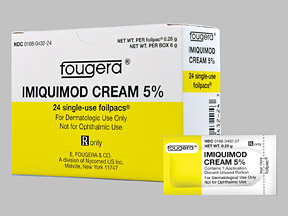
Aldara Coupons & Savings Card – Discount Prices from $10.63
Brand for: Imiquimod
My prescription
Edit
5%, Imiquimod (12 Creams)
Select pharmacy

CVS
$25.64
COUPON PRICE
Walmart
$10.63
COUPON PRICE
Walgreens
$19.93
COUPON PRICE
Albertsons
$23.20
COUPON PRICEAldara savings card
Show this card to your pharmacist
Walmart
$10.63
BIN
ID
PCN
GRP
019876
LH5C1B4975
CHIPPO
LHX
Powered by
Related immune response modifiers prescriptions
More prescriptions for warts
Related immune response modifiers prescriptions
More prescriptions for warts
Aldara (Imiquimod) dosage forms
Dosage Quantity Price from Per unit 5% 12 Creams $10.63 $0.89 5% 1 Cream $3.18 $3.18 5% 24 Creams $18.76 $0.78
| Dosage | Quantity | Price from | Per unit |
|---|---|---|---|
| 5% | 12 Creams | $10.63 | $0.89 |
| 5% | 1 Cream | $3.18 | $3.18 |
| 5% | 24 Creams | $18.76 | $0.78 |
What is Aldara used for?
Aldara is used for the treatment of certain types of skin conditions, including actinic keratosis, superficial basal cell carcinoma, and external genital warts. It works by stimulating the body's immune response to fight the abnormal skin growths.
Can you get Aldara over the counter?
Aldara (imiquimod) is not available over the counter. It requires a prescription from a healthcare provider.
Does Aldara fight HPV?
Aldara (imiquimod) is a topical medication that can be used to treat external genital and perianal warts caused by certain strains of the human papillomavirus (HPV). It works by stimulating the body's immune response to fight the virus. However, it does not cure HPV itself or eliminate the virus from the body.
Is Aldara a chemotherapy drug?
Aldara is not a chemotherapy drug. It is a topical medication used to treat certain skin conditions, such as actinic keratosis, superficial basal cell carcinoma, and external genital warts. It works by stimulating the immune system to respond to these conditions.
Is imiquimod a chemotherapy cream?
Imiquimod is not classified as a chemotherapy cream. It is an immune response modifier used to treat certain skin conditions, such as actinic keratosis, superficial basal cell carcinoma, and external genital warts. It works by stimulating the body's immune system to fight abnormal skin growths.
